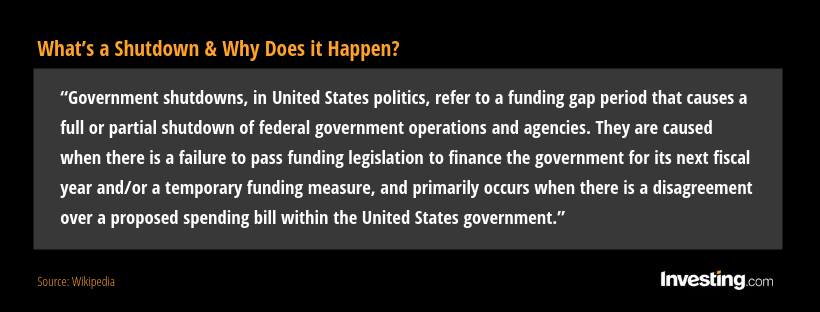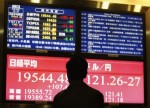
- All Instrument Types
- Indices
- Equities
- ETFs
- Funds
- Commodities
- Currencies
- Crypto
- Bonds
- Certificates
Please try another search

How the U.S. Government Shutdown Affected the Markets
The longest U.S. government shutdown in history occurred between December 22, 2018 - January 25, 2019. It lasted 35 days and was the second shutdown during Trump’s presidency. The main cause for the shutdown is a disagreement between Trump and his opposition on the $5.7 billion funding of the southern border wall. We ended up with very interesting, and somewhat unexpected results.

How the Market Reacted to the Shutdown
According to the U.S. Congressional Budget Office, the latest shutdown cost the American economy some $11 billion in direct costs, however, we were curious as to how the market reacted. To measure the effects, we took a look at the historical data of 7 of the world’s major indices, major U.S. government bonds, and the numbers were very interesting. During the shutdown, each and every index we measured increased in value, varying from around 2% to over 15%, while the U.S. Government bonds went down by around 1% (with one exception).
Government Bonds - What Happened?
We examined 4 major bonds - 1, 5, 10, and 30 years. United States 1-Year dropped by 1.44%, United States 5-Year dropped by 1.48%, United States 10-Year dropped by 1.04%, and interestingly, United States 30-Year went up by 1.19%. The likely reason is not the shutdown itself. As our senior analyst Clement Thibault states: “the Fed raising the interest rates, which generally has an adverse effect on government bonds.”
Indices - What Happened?
In opposition to the government bonds, the indices we examined all went up. On the lower end, the FTSE 100 went up by 1.84%, followed by the Nikkei 225 with 3.01%. The DAX and Euro Stoxx 50 both went up by 6.09% and 6.37% respectively. When it came to the U.S. indices, the change was considerably higher - the S&P 500 and Dow Jones Industrial Average both went up by 13.34% and 13.51%, while the Nasdaq 100 jumped up by 15.69%. Clement suggests that: “The market knows that private companies can operate just fine without the federal government. For the most part, it won't have any effect on their respective businesses, so no reason to panic.”

The Takeaway
While inconclusive, the main takeaway from the results we’ve seen is that a government shutdown can actually propel the market upwards. Do you have a different take? Please let us know in the comments section below.
Related Stories
Are you sure you want to block %USER_NAME%?
By doing so, you and %USER_NAME% will not be able to see any of each other's Investing.com's posts.
%USER_NAME% was successfully added to your Block List
Since you’ve just unblocked this person, you must wait 48 hours before renewing the block.
I feel that this comment is:
Thank You!
Your report has been sent to our moderators for review





Add a Comment
We encourage you to use comments to engage with other users, share your perspective and ask questions of authors and each other. However, in order to maintain the high level of discourse we’ve all come to value and expect, please keep the following criteria in mind:
Enrich the conversation, don’t trash it.
Stay focused and on track. Only post material that’s relevant to the topic being discussed.
Be respectful. Even negative opinions can be framed positively and diplomatically. Avoid profanity, slander or personal attacks directed at an author or another user. Racism, sexism and other forms of discrimination will not be tolerated.
Perpetrators of spam or abuse will be deleted from the site and prohibited from future registration at Investing.com’s discretion.